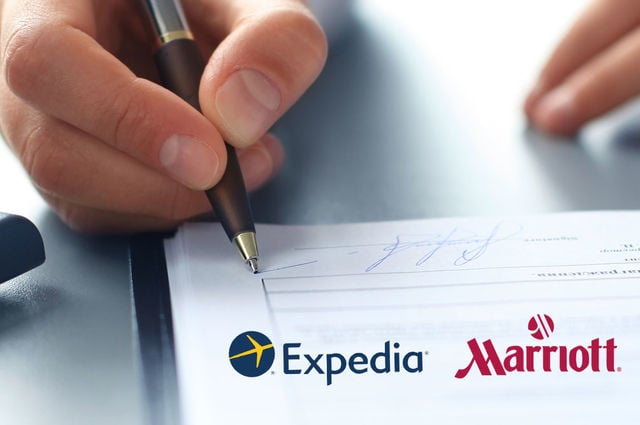Wholesale distribution is poisoned: Could an OTA be the antidote?
8 experts shared their view
Though not completely unexpected (in April, the two companies openly admitted they were working together on a distribution platform), the Expedia Partner Solution/Marriott agreement created an unprecedented event in the industry. But, if it is indisputable that having all the wholesale distribution transitioning through EPS will improve Marriott properties' accuracy and consistency across third-parties, the assumption that this deal will ultimately help Marriott regain control over their rates and inventory is, at best, debatable. EPS technology does not, in fact, prevent bedbanks (or Expedia itself, for that matter) from distributing wholesale rates. So, does the deal only means that EPS is going to play detective with bedbanks on Marriott's behalf? Or the partnership between these two travel Goliath has the potential to fix a distribution model that's inherently rotten? What's your take?
'Naked' rates (net rates designed to be packaged appearing with low or even no markups on disparate online channels) have been the bane of hoteliers lives for the past two decades. While the Marriott/Expedia deal will not prevent unscrupulous distributors from trying to continue with such practices, Expedia's monitoring technology should be able to quickly identify and shut down, the offenders.
One small step for man, one giant leap for mankind!.
It's hard to take this at face value if the stated purpose is to get third party distributors to follow Marriott's rate directions. The problem really hits the fan when the supplier provides rates to a wholesaler who sends them to someone further upstream (like an OTA) to sell. The intent of the hotelier is that the wholesale rate will be packaged with something else so the traveler never sees the discount, which would mess with their rate parity on other channels. Sometimes that wholesaler, under the presumption that the seller will package it, doesn't even pass on a (minimum) sell rate to the OTA—just the merchant cost. When the OTA marks it up and sells it for substantially less than the BAR, the hotel complains—but since they don't know who sold the rate to the OTA, they don't know who to fight with.
Having Expedia insert itself into the process in the place of the chain doesn't change anything. They can still monitor sites for rogue rates, but if they don't know where the OTA is a getting the rate from, what can they do? It is technically possible to put tracers on the rates, but I don't know of anyone who's done that in practice.
It's also important to note that Expedia has been one of the biggest offenders in selling package rates directly to customers—but they do it a day after the customer buys a flight and claim it's a package with the two purchases just separated by a little time. It's good to know Expedia has such a great sense of humor!
I suspect this is about something very different. I sometimes think I can hear Marriott's Marsha creaking under the load of modernity. The distribution team must be wondering what they can possibly do for a second act. Once attribute based shopping becomes more prevalent, Marriott won't be able to compete with Marsha on the back end.
I suspect this may be a trial balloon to see if Expedia might someday replace all of Marriott's CRS systems. Expedia is one of very few that have both the technology and the corporate imperative to make it happen.
When I've started to work in the online distribution in 1999 by my boss and guru Pancho Mazza (r.i.p.) told me: the customer on the Internet is transitional. This is still THE thing. Online customer goes where it's better for it, and nowadays it's pretty easy to get informed and compare. We're all in the same global market: countries differentiations, wholesalers, bed banks, consolidators, groups, tour operators = old stuff.
This market is still made of the same fundamentals: demand and supply but real-time connected at the speed of light. No cache, no phone calls, no requests, no presell. Between supply and demand, the king metric is CPS Cost per Sale. So Mariott restricting its wholesaler's operations to Expedia b2b, would "legally" help in the short term. I understand this, and I think it's an excellent short term business decision. Meanwhile, if it will be a Mariott competitor, smart enough to leverage in real-time the CPS power of a direct distributor (as they are), able to beat the tech guys (Expedia) in their game, it will win. Koddi, TravelGateX, Profiter, Fornova, Arise, DataArt, Triometrics are the first names of the modern/future distribution that come to my mind — not leashing legal agreements.
The new arrangement between Marriott and Expedia is very much like the arrangement Marriott has with the GDS like Sabre, Amadeus and TravelPort i.e. as with a technology distribution platform. If you are a travel agency or a TMC, talk to the GDS how to access Marriott's inventory, availability and retail pricing. If you are a small to midsize tour operator, bed bank or wholesaler, talk to Expedia.
Much more efficient and cost effective for Marriott, compared to having to deal with direct connects with smaller players, or paying transaction fees to DHISCO and the GDS as is the case with many of these smaller wholesalers today.
So going forward I believe the following will happen:
- Marriott will continue to work directly with all the big tour operators and wholesalers, and with all of its existing direct connects, same as before.
- Marriott will push the midsize and smaller tour operators and wholesalers to use Expedia's EPS as it is more cost effective to Marriott, compared to the GDS or DHISCO.
Whatever Marriott pays per reservation to DHISCO or the GDS, I am positive Marriott has negotiated a lower transaction fee with Expedia.
Expedia does not get commissions from the wholesale rates, but a simple technological CRS transaction fee per reservation.
A high-level executive from a niche OTA once told my students, “We need a mega channel manager to manage all channel managers”. This quote explains the complexity of distribution and communication (including content, rate, and availability) between hotels and other stakeholders. The Marriott & Expedia wholesale agreement cannot solve all problems, but it is a starting point for both parties to leverage their own strengths in order to gain efficiency. This agreement may be a potential solution for hoteliers to respond to an evolving distribution ecosystem; on the other hand, a potential revenue source enhancing the return on technology developed by Expedia.
Delegating the distribution of rate, availability, and content to technology powerhouse affords hotel companies to provide a more simplified solution to franchisees, to focus on creating better content, and to develop customer brand equity. Another potential benefit will be access to data, for example, the comprehensive overview of wholesaler productions. This data could be combined with data from brand.com, search and social to understand demand better. Nevertheless, this agreement may signify hotel companies will be more conservative in in-house technology investment and search for the best outsourcing option.
OTAs facing the threats of Google must identify its own strengths - working with properties through account managers, offering rich and sharable market insights, and technology. The human touch through account managers is a competitive advantage against Google. OTAs may further provide integrated back of house technology solutions (property management system, apps, revenue management) to address the notorious compatibility problems. Alternatively, OTAs could serve as a market place to connect niche hospitality technology players with hoteliers.
This agreement may indicate OTAs and hotel groups could develop trust. Will more hotel companies follow?
In the past week, the news of Thomas Cook going bankrupt was like a media eclipse, and rightfully so. Yet, there was another bankrupcy that went rather unnoticed, and that is of Amoma, a company notorious for undercutting hotel's own rates, selling often from uncontracted inventory from wholesalers.
How does that relate with the Marriott International and Expedia Partner Solutions agreement? Well, one would guess that Marriott has had it with policing the internet and trying to find all the cases of rate disparity existing out there within its vast portfolio of hotels and contracted (and uncontracted) rates.
By going to bed - pun intended - with EPS, Marriott is chosing a key partner as gatekeeper in the hopes that the benefits will exceed the costs and potential risks of being associated with a sole partner. It's potentially a sound move. But it will be interesting to see how Booking and Ctrip will respond and adapt...
To be clear: I don't think an OTA is the antidote. It's a quick fix, a short-term solution, to a problem that requires a long-term plan and resources that many hoteliers - including Marriott - perhaps don't want to address head-on at this stage.
If anything, the deal is another step to dismantle the (dangerous) "Them vs. Us" mentality that most hotels still maintain towards online travel agencies. On the other side of the table, Expedia's move confirmed that the OTAs' model is definitively shifting towards the B2B's realm and, as I've been saying over and over again for the last five years, I won't be surprised to see Expedia and Booking shapeshift to SaaS companies in the near future.
Read full view here.
This is a smart business decision by Marriott if they indeed were able to bring their commission down to a single digit. Wholesale business is a small chunk of Marriott's revenue and if this played a role in significantly reducing their overall commission, great move!
EPS is a good but imperfect solution that can allow hotels to regain control over their distribution and prevent rate leakage. EPS technology is solid, makes it easy for all parties to access up to date hotel content and it has the capabilities to make it harder for connected parties to leak rates. Now that Marriott has only Expedia to blame if they keep getting undercut online, it should encourage Expedia to police bad behavior on behalf of Marriott. It's in the major OTAs best interest to make it much harder for rogue OTAs to survive. I believe stopping rate leakage will eventually cause most of them to disappear.
There are two factors that will be interesting to look at moving forward:
1. Will more hotels trust Expedia with so much control over their distribution?
2. Do hotels want more transparency into where their inventory is ending up online?
As an Arise co-founder, I believe hotels will be better off distributing their data using a technology that transparently and verifiably works in their best interests.








